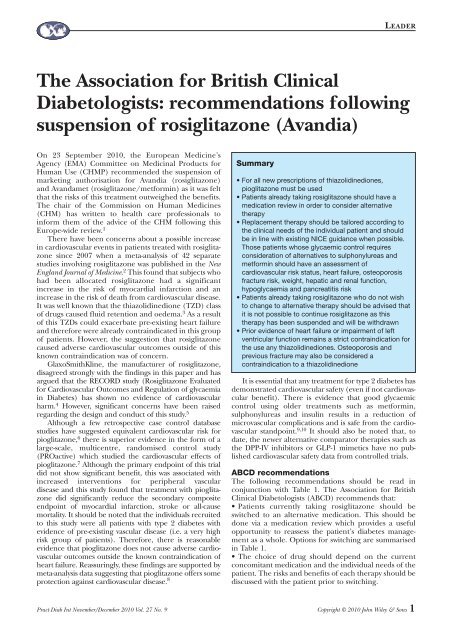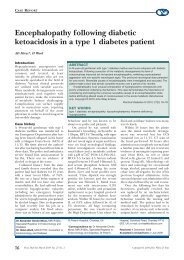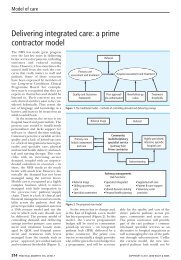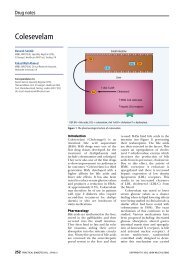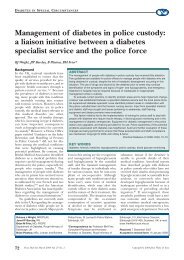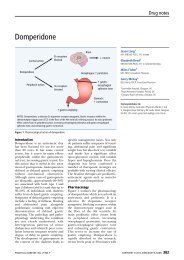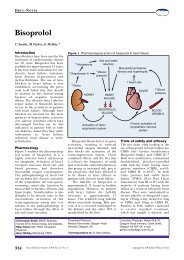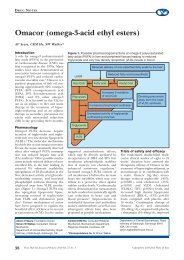Recommendations following suspension of ... - Practical Diabetes
Recommendations following suspension of ... - Practical Diabetes
Recommendations following suspension of ... - Practical Diabetes
Create successful ePaper yourself
Turn your PDF publications into a flip-book with our unique Google optimized e-Paper software.
LEADERThe Association for British ClinicalDiabetologists: recommendations <strong>following</strong><strong>suspension</strong> <strong>of</strong> rosiglitazone (Avandia)On 23 September 2010, the European Medicine’sAgency (EMA) Committee on Medicinal Products forHuman Use (CHMP) recommended the <strong>suspension</strong> <strong>of</strong>marketing authorisation for Avandia (rosiglitazone)and Avandamet (rosiglitazone/metformin) as it was feltthat the risks <strong>of</strong> this treatment outweighed the benefits.The chair <strong>of</strong> the Commission on Human Medicines(CHM) has written to health care pr<strong>of</strong>essionals toinform them <strong>of</strong> the advice <strong>of</strong> the CHM <strong>following</strong> thisEurope-wide review. 1There have been concerns about a possible increasein cardiovascular events in patients treated with rosiglitazonesince 2007 when a meta-analysis <strong>of</strong> 42 separatestudies involving rosiglitazone was published in the NewEngland Journal <strong>of</strong> Medicine. 2 This found that subjects whohad been allocated rosiglitazone had a significantincrease in the risk <strong>of</strong> myocardial infarction and anincrease in the risk <strong>of</strong> death from cardiovascular disease.It was well known that the thiazolidinedione (TZD) class<strong>of</strong> drugs caused fluid retention and oedema. 3 As a result<strong>of</strong> this TZDs could exacerbate pre-existing heart failureand therefore were already contraindicated in this group<strong>of</strong> patients. However, the suggestion that rosiglitazonecaused adverse cardiovascular outcomes outside <strong>of</strong> thisknown contraindication was <strong>of</strong> concern.GlaxoSmithKline, the manufacturer <strong>of</strong> rosiglitazone,disagreed strongly with the findings in this paper and hasargued that the RECORD study (Rosiglitazone Evaluatedfor Cardiovascular Outcomes and Regulation <strong>of</strong> glycaemiain <strong>Diabetes</strong>) has shown no evidence <strong>of</strong> cardiovascularharm. 4 However, significant concerns have been raisedregarding the design and conduct <strong>of</strong> this study. 5Although a few retrospective case control databasestudies have suggested equivalent cardiovascular risk forpioglitazone, 6 there is superior evidence in the form <strong>of</strong> alarge-scale, multicentre, randomised control study(PROactive) which studied the cardiovascular effects <strong>of</strong>pioglitazone. 7 Although the primary endpoint <strong>of</strong> this trialdid not show significant benefit, this was associated withincreased interventions for peripheral vasculardisease and this study found that treatment with pioglitazonedid significantly reduce the secondary compositeendpoint <strong>of</strong> myocardial infarction, stroke or all-causemortality. It should be noted that the individuals recruitedto this study were all patients with type 2 diabetes withevidence <strong>of</strong> pre-existing vascular disease (i.e. a very highrisk group <strong>of</strong> patients). Therefore, there is reasonableevidence that pioglitazone does not cause adverse cardiovascularoutcomes outside the known contraindication <strong>of</strong>heart failure. Reassuringly, these findings are supported bymeta-analysis data suggesting that pioglitazone <strong>of</strong>fers someprotection against cardiovascular disease. 8Summary• For all new prescriptions <strong>of</strong> thiazolidinediones,pioglitazone must be used• Patients already taking rosiglitazone should have amedication review in order to consider alternativetherapy• Replacement therapy should be tailored according tothe clinical needs <strong>of</strong> the individual patient and shouldbe in line with existing NICE guidance when possible.Those patients whose glycaemic control requiresconsideration <strong>of</strong> alternatives to sulphonylureas andmetformin should have an assessment <strong>of</strong>cardiovascular risk status, heart failure, osteoporosisfracture risk, weight, hepatic and renal function,hypoglycaemia and pancreatitis risk• Patients already taking rosiglitazone who do not wishto change to alternative therapy should be advised thatit is not possible to continue rosiglitazone as thistherapy has been suspended and will be withdrawn• Prior evidence <strong>of</strong> heart failure or impairment <strong>of</strong> leftventricular function remains a strict contraindication forthe use any thiazolidinediones. Osteoporosis andprevious fracture may also be considered acontraindication to a thiazolidinedioneIt is essential that any treatment for type 2 diabetes hasdemonstrated cardiovascular safety (even if not cardiovascularbenefit). There is evidence that good glycaemiccontrol using older treatments such as metformin,sulphonylureas and insulin results in a reduction <strong>of</strong>microvascular complications and is safe from the cardiovascularstandpoint. 9,10 It should also be noted that, todate, the newer alternative comparator therapies such asthe DPP-IV inhibitors or GLP-1 mimetics have no publishedcardiovascular safety data from controlled trials.ABCD recommendationsThe <strong>following</strong> recommendations should be read inconjunction with Table 1. The Association for BritishClinical Diabetologists (ABCD) recommends that:• Patients currently taking rosiglitazone should beswitched to an alternative medication. This should bedone via a medication review which provides a usefulopportunity to reassess the patient’s diabetes managementas a whole. Options for switching are summarisedin Table 1.• The choice <strong>of</strong> drug should depend on the currentconcomitant medication and the individual needs <strong>of</strong> thepatient. The risks and benefits <strong>of</strong> each therapy should bediscussed with the patient prior to switching.Pract Diab Int November/December 2010 Vol. 27 No. 9 Copyright © 2010 John Wiley & Sons 1
LEADER<strong>of</strong>fered medications for which there are no safety datain pregnancy (such as incretin-based therapies or pioglitazone)unless they are using effective contraception.Also, all such women should be given appropriatepre-conception counselling.• The local diabetes specialist team should be contactedfor advice if needed.• Prior evidence <strong>of</strong> heart failure or impairment <strong>of</strong> leftventricular function remains a contraindication for theuse <strong>of</strong> these medications and this should be rigidlyadhered to. Osteoporosis and previous fracture may alsobe considered a relative contraindication to a TZD inpost-menopausal females.ABCD will keep this advice under review as new informationbecomes available.Niru Goenka, Aled Roberts, Susannah Rowles,Bob Ryder and Peter Winocour; on behalf <strong>of</strong> theAssociation <strong>of</strong> British Clinical DiabetologistsAcknowledgementWe would like to thank Frank Joseph and David Ewinsfor their input.Conflict <strong>of</strong> interest statementDr Niru Goenka has given lectures or attended meetingssponsored by MSD, Eli Lilly, Novo Nordisk and Bristol-Myers Squibb. Any honoraria from these meetings arepaid either to the departmental diabetes education andresearch trust fund, or to other registered charities.Dr Aled Roberts has received educational sponsorshipand/or honoraria for lectures from Astra Zeneca,Novo Nordisk and MSD.Dr Susannah Rowles has previously received speaker’sfees from a number <strong>of</strong> pharmaceutical companies includingEli Lilly, GlaxoSmithKline, San<strong>of</strong>i-Aventis and Takeda.Dr Bob Ryder has previously received educationalsponsorship from a number <strong>of</strong> pharmaceutical companiesincluding Eli Lilly, GlaxoSmithKline, Novo Nordisk,San<strong>of</strong>i-Aventis and Takeda. He has served on advisorypanels and has received speaker’s fees from bothGlaxoSmithKline and Takeda.Dr Peter Winocour has received support to attendmeetings and honoraria from Eli Lilly, Novo Nordisk,MSD, Takeda and Novartis.References1. www.mhra.gov.uk/Safetyinformation/Safetywarningsalertsandrecalls/Safetywarningsandmessagesfmedicines/CON094121[accessed 01/01/2010].Table 2. Switching from rosiglitazone to pioglitazoneCurrent HbA1c Suggestedrosiglitazoneinitial dose <strong>of</strong>dosepioglitazone4mg daily ≤7.5% (58mmol/mol) 15mg4mg daily >7.5% (58mmol/mol) 30mg8mg daily ≤7.5% (58mmol/mol) 30mg8mg daily >7.5% (58mmol/mol) 45mgIf on Avandamet (rosiglitazone/metformin fixed dosecombination) then individualised therapy as appropriate,or consider pioglitazone/metformin fixed dosecombination if appropriate. The licensed starting doses <strong>of</strong>pioglitazone are 15mg and 30mgAlgorithm based on advice from Takeda (manufacturer <strong>of</strong>pioglitazone) and on a review by Derosa, 2010. 122. Nissen SE, Wolski K. Effect <strong>of</strong> rosiglitazone on the risk <strong>of</strong> myocardialinfarction and death from cardiovascular causes. N Engl J Med2007; 356: 2457–71.3. Nesto RW, et al. Thiazolidinedione use, fluid retention, and congestiveheart failure: a consensus statement from the American HeartAssociation and American <strong>Diabetes</strong> Association. <strong>Diabetes</strong> Care 2004;27: 256–63.4. Home PD, et al. Rosiglitazone evaluated for cardiac outcomes andin oral agent combination therapy for type 2 diabetes (RECORD):a multicentre, randomised, open-label trial. Lancet 2009; 373:2125–35.5. Nissen SE. Setting the RECORD straight. JAMA 2010; 303: 1194–5.6. Wertz DA, et al. Risk <strong>of</strong> cardiovascular events and all-cause mortalityin patients treated with thiazolidinediones in a managed-carepopulation. Circ Cardiovasc Qual Outcomes 2010; 3: 538–45. Epub 24Aug 2010.7. Dormandy JA, et al. Secondary prevention <strong>of</strong> macrovascular eventsin patients with type 2 diabetes in the PROactive Study(PROspective pioglitAzone Clinical Trial In macroVascular Events):a randomised controlled trial. Lancet 2005; 366: 1279–89.8. Linc<strong>of</strong>f AM, et al. Pioglitazone and risk <strong>of</strong> cardiovascular events inpatients with type 2 diabetes mellitus: a meta-analysis <strong>of</strong> randomizedtrials. JAMA 2007; 298: 1180–8.9. Effect <strong>of</strong> intensive blood-glucose control with metformin on complicationsin overweight patients with type 2 diabetes (UKPDS 34).UK Prospective <strong>Diabetes</strong> Study (UKPDS) Group. Lancet 1998; 352:854–65.10. Intensive blood-glucose control with sulphonylureas or insulincompared with conventional treatment and risk <strong>of</strong> complicationsin patients with type 2 diabetes (UKPDS 33). UK Prospective<strong>Diabetes</strong> Study (UKPDS) Group. Lancet 1998; 352: 837–53.11. National Institute for Health and Clinical Excellence. Type 2 diabetes:newer agents. NICE short clinical guideline 87. May 2009.(http://guidance.nice.org.uk/CG87.)12. Derosa G. Switching from rosiglitazone to pioglitazone: clinicalimplications. Terapia Evidence Based 2010; 3(2). Epub ahead <strong>of</strong> printISSN 2035-3162.Pract Diab Int November/December 2010 Vol. 27 No. 9 Copyright © 2010 John Wiley & Sons 3


